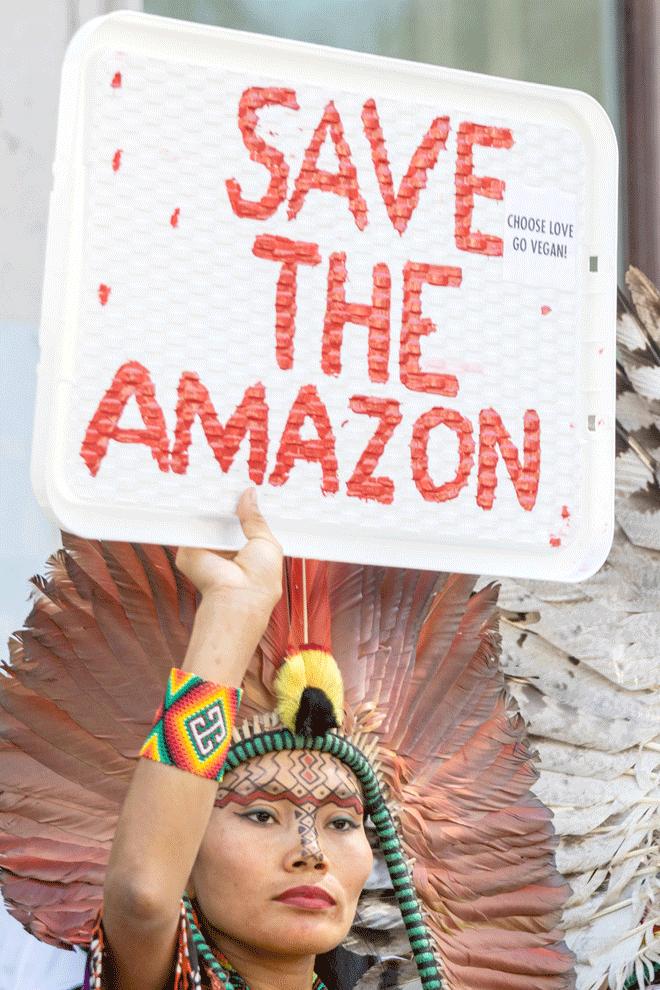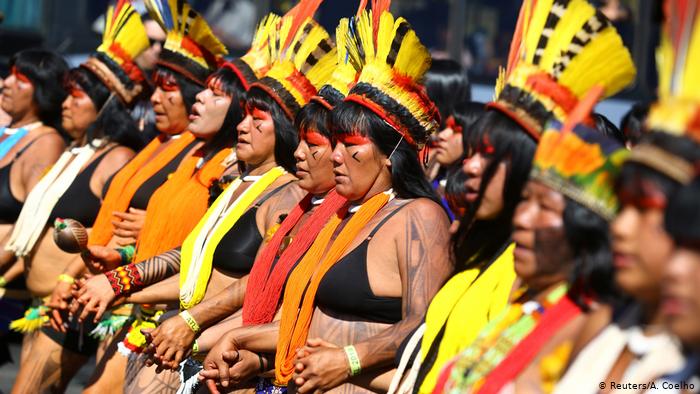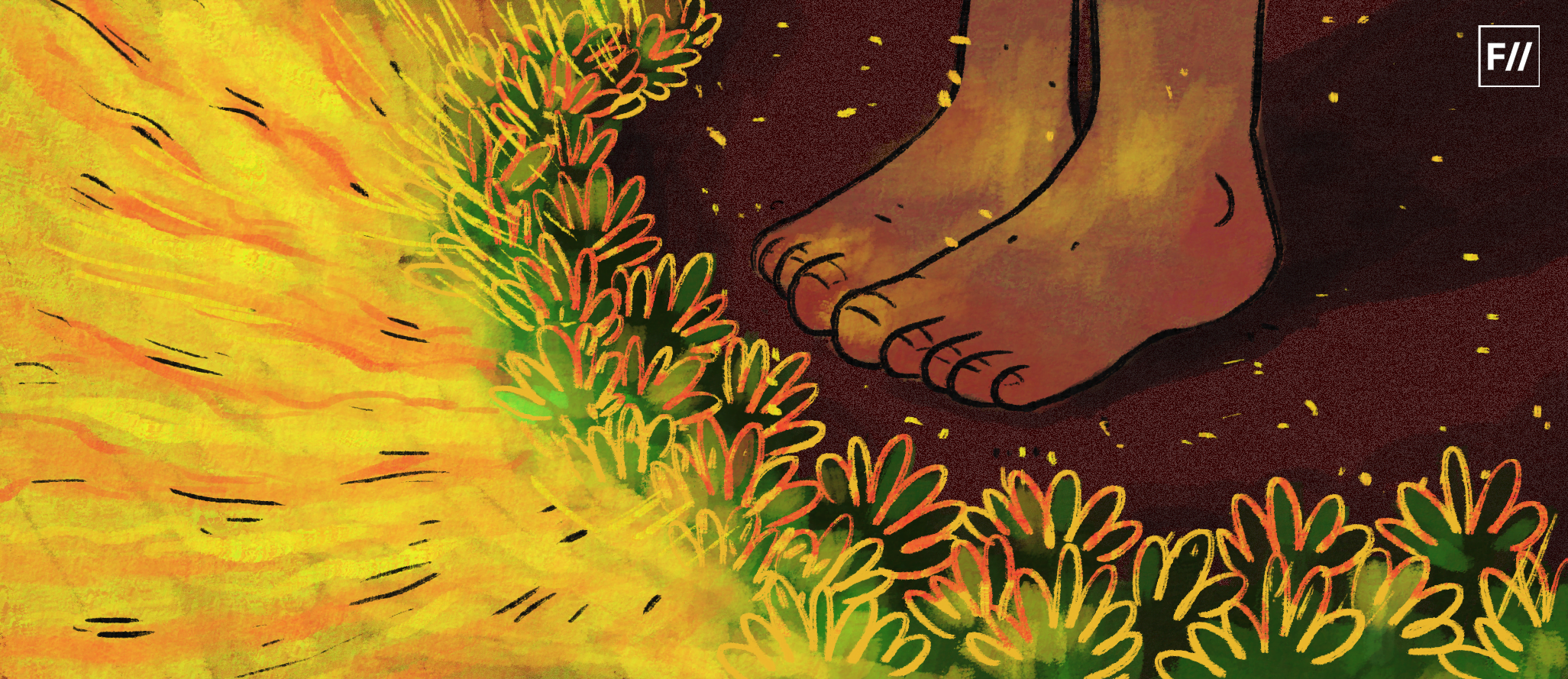Most of the Amazon rain forest finds itself in Brazil. Official government data has shown that deforestation under the Bolsonaro administration has increased alarmingly. According to Brazil’s National Institute for Space Research, there have been more than 72,000 forest fires in Brazil in 2019 alone, an 84% jump from 2018’s data of the same period. Today, as the Amazon burns and the world watches, it is hard to ignore the protests that have been going on against Bolsonaro. At the forefront of these protests are indigenous women, who are fighting for the environment and for their rights.
Bolsonaro has in the past issued many controversial and offensive statements on indigenous tribes in Brazil. In 1998, Bolsonaro was quoted saying, “It’s a shame that the Brazilian cavalry hasn’t been as efficient as the Americans, who exterminated the Indians.” Even during his campaign, he promised to do away with lands reserved for indigenous tribes.

Earlier this month, hundreds of indigenous women took to the streets in Brasilia, to protest against the President’s policies. The women occupied a building of the health ministry in the capital, demanding better healthcare for indigenous tribes. They later joined the ‘March of the Margaridas‘, where they protested against Bolsonaro’s genocidal policies and called for the conservation of the Amazon rain forest. Donning their bows, arrows and spears, indigenous women carried banners that read ‘resist in order to exist’ as they marched towards Congress.
as the Amazon burns and the world watches, it is hard to ignore the protests that have been going on against Bolsonaro. At the forefront of these protests are indigenous women, who are fighting for the environment and for their rights.
There’s no doubt about the fact that the Amazon rain forest and the many diverse species that call it home need to be conserved, but Bolsonaro, according to the Washington Post, is a “powerful supporter of agribusiness”. He has also not shied away from his desire to expand nuclear and hydroelectric power in the Amazon. Activists and environmental experts worry Bolsonaro’s policies will only lead to severe destruction of the rain forest, which will have a devastating consequences on the already worsening global climate crises.
It will affect indigenous people even more. Most indigenous tribes in Brazil live on protected lands, a large majority of them live in the Amazon rain forest. The Brazilian President remains strong on his stance of opening reserved lands for mining and grazing, choosing to ignore the negative ecological impact of such activities on the lives of indigenous people.
Also read: How To Travel Without Expanding Your Ecological Footprint
Kenn Orphan, in an article on Counterpunch.org explains, “The assault on indigenous peoples is a war on the biosphere itself. The ruling class in Brazil, as in every other colonised region of the planet, see their existence as an obstacle and nuisance to their wealth accumulation.” Orphan goes on to recognise the importance of resistance at a time like this, “Indigenous people, especially indigenous women, are rising up against it. Their courage should inspire us because this should be understood as a war that we will all be swept up into whether we like it or not. The question is, will we choose the right side.”
Indigenous women in Brazil are fulfilling the roles of protector and forest managers while also leading the movement to protect their lands and the biodiversity of the Amazon. In an interview with Dazed Digital, Rayanne Cristine Maximo Franca, a 25-year-old indigenous youth activist from the Amazon explains, “As a group, we are going through an extremely important time. Currently in Brasília, the First Indigenous Women March in our history is taking place, with the presence of thousands of indigenous women, among them, indigenous girls and young women.”
ACTIVISTS AND ENVIRONMENTAL EXPERTS WORRY BOLSONARO’S POLICIES WILL ONLY LEAD TO SEVERE DESTRUCTION OF THE RAIN FOREST, WHICH WILL HAVE A DEVASTATING CONSEQUENCES ON THE ALREADY WORSENING GLOBAL CLIMATE CRISES.
She underlines the importance of indigenous women mobilizing, “The government approves huge business endeavours such as the installation of several hydroelectric stations in the Amazon basin. We—women and girls—are occupying spaces where they want to build, and denounce their illegal mining which is toxifying our bodies with mercury… Our bodies are being poisoned. We have been organising ourselves through the sharing of intel among networks, and we are looking for ever more platforms to run workshops, courses and seminars in defence of our rights.”
From Mauna Kea in Hawaii to Standing Rock in North Dakota, Adivasis in India to the Amazon rain forest in Brazil, when it comes to protecting their land and rights, indigenous people have to fight the hardest. Tribes in Brazil have been on the receiving end of violence for many years. While mainstream media has picked up speed on their coverage of the Amazon fires, they have still largely ignored the struggle of indigenous people in the region.
Also read: Feminism Vs Environmentalism And The Question Of Menstrual Choice
But we cannot continue this dangerous trend. The fight for climate change cannot be fought without recognizing the struggle of indigenous people. Andre Pagliarini, in his article for The New Republic sums it up, “The international community, accustomed to dismissing indigenous matters as a fringe or ephemeral issues, will have to adjust to today’s reality: The same rapacious forces that have threatened indigenous ways of life for decades imperil the world by accelerating the devastating effects of climate change. We are late, perhaps irreversibly so, to this realisation.”
Featured Image Source: DW
About the author(s)
Purnima is a wannabe writer and a want-to-be cat mom.




